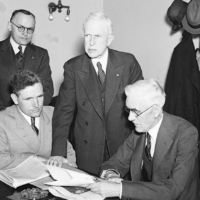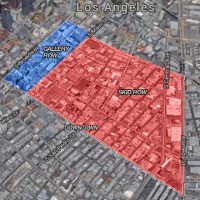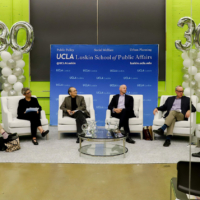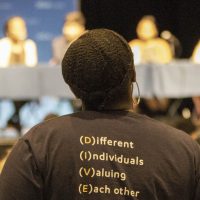L.A. Asks How to Equitably Achieve 100% Clean Energy by 2035 — and UCLA Answers Luskin School research centers join cross-campus effort to guide LADWP strategies centered on equity and justice
By Mara Elana Burstein
In 2021, after the LA100 analysis laid out pathways for the city of Los Angeles to produce 100% renewable electricity, the City Council and Los Angeles Department of Water and Power committed to pursuing the most ambitious — and expensive — scenario: achieving the goal by 2035 at a cost of nearly $40 billion.
But cost is far from the only challenge. Facing a legacy of inequity within the city’s energy system, the LADWP turned to UCLA researchers to develop strategies for pursuing clean energy without perpetuating social, racial and economic injustices.
Five teams convened by the Sustainable LA Grand Challenge answered the call, bringing together more than 20 UCLA faculty and researchers with expertise in engineering, environmental science, law, labor studies, public health and urban policy. Working with researchers from the U.S. Department of Energy’s National Renewable Energy Laboratory, which offered computing power and technical capacity, these scholars provided a deep local context, as well as behavioral, social and political expertise, to help Los Angeles ensure a more just transition.
The release of their two-year study, the LA100 Equity Strategies report, was announced today at a press conference at LADWP headquarters downtown, where Mayor Karen Bass’ “Powered by Equity” initiative, based on the report’s findings, was also unveiled.
“We have an opportunity to be innovative and bold,” Bass said in a press release. “We have an opportunity to shape our clean energy future in a manner that delivers benefits to community residents and our LADWP customers in the neighborhoods where they live. We’re making a conscious decision to take intentional clean energy actions that are ‘Powered by Equity,’ as recommended by the newly released LA100 Equity Strategies research study.”
Stephanie Pincetl, a co-author of the report and director of the UCLA California Center for Sustainable Communities, welcomed the initiative, which will kick off with a LADWP project to build, operate and maintain a network of electric vehicle charging stations in underserved communities.
“No other utility in the United States has made a commitment to not only 100% renewable but making sure it’s implemented equitably,” said Pincetl, who earned a PhD in urban planning from UCLA in 1985. “This is the power of a municipal utility, a utility owned by and for its customers.”
The UCLA authors of LA100 Equity Strategies found that significant changes will be necessary to prevent the energy system’s injustices from increasing both during and after the transition, particularly for underserved communities of color, which currently bear the brunt of bad air quality, extreme heat and electrical outages. Without mitigation, these communities are projected to pay more for energy and experience fewer benefits over time.
To that end, UCLA’s approach has been justice-centered, providing community-informed, evidence-driven strategies and recommendations on affordability and policy solutions, air quality and public health, green jobs and workforce development, and housing and buildings.
The cost of electricity will rise with the transition to clean energy, with average electricity bills predicted to increase by nearly 80% for households overall and by more than 130% for low-income households by 2035. Addressing those rate hikes has been a key goal for UCLA researchers.
The work of the UCLA Luskin Center for Innovation, supported by the UCLA Institute of the Environment and Sustainability, provides specific recommendations for robust, long-term structural solutions to improve LADWP customers’ ability to pay their energy bills. These include addressing regulations that constrain rate affordability and continuing to explore and scale up innovative approaches to support affordability for ratepayers.
“Affordability is a key equity concern for all LADWP stakeholders, and protections for lower-income customers must be expanded,” said Gregory Pierce, a report co-author and research director of the Luskin Center for Innovation. “And as exposure to extreme heat increases, universal access to residential cooling is essential.”
The UCLA Center for Neighborhood Knowledge and the UCLA Latino Policy and Politics Institute analyzed aspects of energy affordability for small ethnic-owned businesses. They recommended that the LADWP partner with community-based organizations to better engage with these businesses.
Other projects, led by teams from the UCLA Fielding School of Public Health, UCLA Institute for Research on Labor and Employment and UCLA California Center for Sustainable Cities, focused on improving air quality, promoting green jobs abd equitable workforce development, and proving energy upgrades to housing and other buildings, many of them in disadvantaged neighborhoods.
Achieving the city’s carbon-neutral goal equitably requires intentional, community-informed, bold decisions adapted over time, and UCLA will continue to work with the LADWP and local communities on these efforts.
Importantly, the researchers say, UCLA’s methods, tools, insights and strategies not only support the LADWP’s efforts but can be used other cities seeking a just energy transition.
In addition to Pincetl and Pierce, the UCLA teams were led by Paul Ong, director of the UCLA Center for Neighborhood Knowledge; Yifang Zhu, professor of environmental health sciences at the UCLA Fielding School of Public Health; Raúl Hinojosa-Ojeda, director of North America Integration and Development Center at UCLA; and Abel Valenzuela Jr., interim dean of social sciences and professor at the UCLA Institute for Research on Labor and Employment.










Leave a Reply
Want to join the discussion?Feel free to contribute!